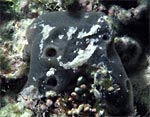 All animals, from the simplest invertebrates to humans, arose from a common ancestor that existed over 600 million years ago. Recent molecular phylogenetic and developmental data indicate that demosponges are part of the most ancient and basal metazoan lineage and have many hallmarks of animal development, including gastrulation and pattern formation. Sequencing the genome of the tropical demosponge Reniera will define genetic features that are unique to and shared by all animals–humans to sponges–and are likely to have been present in the genome of the very first animals. As such, this sequencing project will contribute significantly to our understanding of very early animal evolution.
All animals, from the simplest invertebrates to humans, arose from a common ancestor that existed over 600 million years ago. Recent molecular phylogenetic and developmental data indicate that demosponges are part of the most ancient and basal metazoan lineage and have many hallmarks of animal development, including gastrulation and pattern formation. Sequencing the genome of the tropical demosponge Reniera will define genetic features that are unique to and shared by all animals–humans to sponges–and are likely to have been present in the genome of the very first animals. As such, this sequencing project will contribute significantly to our understanding of very early animal evolution.
In addition, sponges possess commercially desirable biosynthetic capabilities. Indeed, a majority of biodiscovery endeavors in the sea are directed toward sponges and the diverse and unique bioactive compounds they produce for application in pharmaceutical, agrochemical, and marine industries. The molecular basis of biomineralization of the siliceous spicules present in demosponges such as Reniera is a target for marine biotechnology and the communications industry. This genome project will discover the genes encoding the biosynthetic pathways responsible for these commercially important traits.
CSP project participants: Bernard Degnan (proposer, Univ. of Queensland, Australia), Sally Leys (proposer, Univ. of Alberta), Mark. Q. Martindale (proposer, Univ. of Hawaii), and Dan Rokhsar (proposer, JGI).